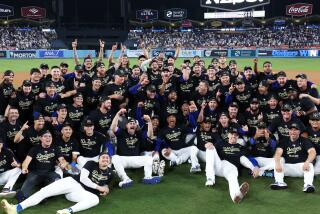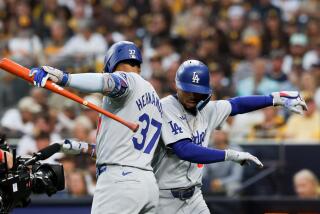Browning Continues Mastery of Padres, 2-0
- Share via
SAN DIEGO — There was only one thing wrong with Jimmy Jones’ pitching performance Saturday night. He had the misfortune to be matched against Tom Browning.
Browning had pitched a one-hit shutout at the Padres June 6, and his tantalizing repertoire of off-speed stuff was just as big a mystery this time. He carried a two-hitter into the ninth inning, then gave up two more hits before John Franco preserved a 2-0 victory for Browning and the Cincinnati Reds in front of 20,387 at San Diego Jack Murphy Stadium.
Franco’s save was his 13th in July, and with it he set a major league record for saves in a month. The previous record of 12 was set by Sparky Lyle of the New York Yankees in 1973 and tied by Bruce Sutter of the Chicago Cubs in 1979 and Bob Stanley of the Boston Red Sox in 1980.
Franco’s save was also his 12th in a row and his 22nd in 23 opportunities this season. He achieved it with just four pitches, forcing both Roberto Alomar and Tony Gwynn to tap into force-outs with the potential tying runs on base.
But the real story of the game was Browning, a 28-year-old left-hander who has rebounded from a horrendous 1987 season to build a 10-4 record and a 3.28 earned run average.
A year ago, Browning was so bad that the Reds sent him to the minor leagues for a month late in the season, and he didn’t even do well there. He had ERAs of 5.02 at Cincinnati and 6.07 at triple-A Nashville. Now he is one of the most effective pitchers in the National League, just as he was when he won 20 games as a rookie in 1985.
What caused Browning’s remarkable turnaround?
“He changes speeds well, and he’s always ahead of the hitters,” Padre Manager Jack McKeon said. “Last year, he kept getting behind, and the hitters waited on his fastball. His velocity is only average or below, so he kept getting burned.”
Gwynn, who had one of the four hits off Browning, said, “All he does is change speeds and keep the ball around the plate. Either you hit him or you don’t, and lately we haven’t.”
In Browning’s other start against the Padres, also in San Diego, he had a no-hitter until Gwynn singled with one out in the ninth. This time, Gwynn broke up the no-hit bid with two out in the fourth.
“I’ve had some worse days,” Browning said, smiling. “Tonight was probably the best game I’ve thrown all year. I didn’t walk anybody, and I got ahead of the hitters, which is the name of the game for me.
“I had a good straight change, and I was hitting the corners with it. I didn’t want to come out in the ninth, but the situation called for it.”
Under normal circumstances, Jones, whose record dropped to 7-9, probably would have come away with a victory. But with Browning around, he would have had to pitch a shutout to stay even, and he wasn’t quite that good. He yielded runs in the fourth and sixth innings, Nick Esasky and Jeff Reed driving them in with singles.
“Browning just had one of those nights,” Jones said. “I made some mistakes, and they cost me. Going in, the only thing I was worried about was getting the ball up, and that’s exactly what happened. I was battling too much. I should have just thrown the ball and gone right at it.”
The key hit off Jones was a triple by Paul O’Neill with one out in the fourth. O’Neill scored on Esasky’s single, and the Reds picked up their insurance two innings later on singles by Eric Davis, O’Neill and Reed.
“O’Neill hit his triple on an outside sinker ball,” Jones said. “He reached out and hit it. I thought the pitch Esasky hit was a good pitch inside, but he fought it off. I thought I had him off balance.”
While Browning breezed through the first three innings without a slip, the Reds stirred up a threat an inning against Jones. Each time they nicked him for a double, and each time he wriggled free.
The first double, by Kal Daniels, opened the game. Barry Larkin followed with a walk, but Chris Sabo flied out and Davis grounded into a double play.
The two other doubles, by Reed in the second inning and Larkin in the third, came with two out and were followed by groundouts by Ron Oester and Sabo, respectively.
“He kept scrambling out of jams,” McKeon said. “You have to give him credit, because he wasn’t pitching all that well at the time. He was trying to be too fine.”
In the fourth, however, Jones was less fortunate. With one out, O’Neill hit a line drive to center field. Stanley Jefferson made a desperate attempt at a diving, backhand catch but couldn’t quite reach the ball, and it shot past him for a triple. When Esasky promptly singled O’Neill home, Browning had all the offensive help he needed.
Just in case, though, the Reds added a run in the sixth when Reed, a catcher acquired recently from the Montreal Expos, hit the second of his three singles.
Aside from Gwynn’s fourth-inning single, which barely escaped the outstretched arms of second baseman Oester, the Padres’ only hit before the ninth was a leadoff single by Keith Moreland in the fifth. He was erased on Garry Templeton’s double play grounder.
But Browning couldn’t quite make it all the way. Mark Parent began the ninth with a single, and with one out, Jefferson also singled. It was then that Red Manager Pete Rose sent for Franco, also a lefty, who wrapped up the game with three pitches to Alomar and one to Gwynn.
“I wish they were all like that,” Franco said. “Tom was pitching such a good game that I didn’t think I’d get in. I only had eight saves through June and I thought it was going to be a so-so year. Now I’m in a groove, and it helps to be getting out there a lot.”
Rose said he didn’t have to think twice before changing pitchers.
“I’ve got a piece of paper here that says, ‘Use Franco in the ninth inning.’ ” Rose said. “Pitchers don’t ever want to come out, but Tom knew we had that stud down in the bullpen.”
More to Read
Go beyond the scoreboard
Get the latest on L.A.'s teams in the daily Sports Report newsletter.
You may occasionally receive promotional content from the Los Angeles Times.










